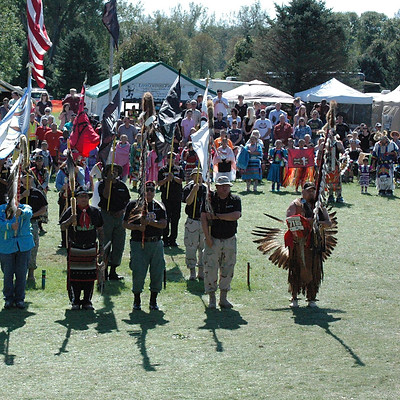
For Visitors
Welcome!
We are always glad to see people attend powwows, and learn more about our cultures and ways, but sometimes not everyone acts appropriately.
Here are some general guidelines to follow:
Powwow, or Wacipi (Wa-chee-pee in Dakota means "they dance”), time is the Native American people's way of meeting together, to join in dancing, singing, visiting, renewing old friendships and making new ones. This is a time to renew thoughts of the old ways and to preserve a rich heritage. It is a celebration of the community.
Grand Entry:
The Wacipi begins with the Grand Entry of all the dancers entering the arena. Leading the Grand Entry are the flag bearers. These flags may include the eagle staffs of various tribes and families in attendance, US flag, tribal flags, service flags and the P.O.W. flag. Flags are usually carried by veterans. Native Americans hold the United States flag in an honored position.
For us, the US flag has two meanings. First, it is a way to remember all of the ancestors that fought against this country. Second, it also reminds people of those people who have fought for this country.
An eagle staff consisting of 38 eagle feathers was made by Glynn Crooks (Dakota) in 1979. Each feather commemorates one of the 38 Dakota executed in Mankato on December 26, 1862. It also commemorates those veterans who have served in times of conflict.
Following the flagbearers are other important guests of the Wacipi including tribal chiefs, elders, and royalty. Next in line, are the men dancers followed by the women dancers, then the children. Once everyone is in the arena, the entrance song ends. The entrance song is immediately followed by a song to honor the flag and a song to honor the veterans. This is followed by an invocation.
During Grand Entry, the flag song, veterans song, and the invocation, spectators are asked to stand and men are asked to remove their hats.
Special Events:
Many of these are sacred and it is requested that NO PICTURES BE TAKEN.
Giveaways honor a special occasion.
If an Eagle Feather is dropped, a ceremony will be performed before the feather can be picked up.
When an intertribal is called, everyone may dance -- you need not be dressed in regalia.
The Arena:
Blessed before dancing, the arena is considered a sacred ground and should be treated with respect. Profanity and unruly behavior should not be used. Never cut across the arena to get to the opposite side. Treat the arena as you would treat a church. Go in the "door" and out the same way. The MC will specify who is to dance and when, and when spectators may participate. This is usually called intertribal dancing, but pay attention to the MC and other dancers before you enter the circle.
The Regalia:
Dancers wear traditional regalia, not costumes, when they dance. Every part of a dancer's regalia is very important to him or her for various reasons. Many hours go into the intricate beadwork and detailing, and full set of regalia may take years to complete. The feathers or leather may be over 100 years old and very fragile. We ask that you never handle any part of a dancer's outfit.
Recording:
Photos of individual dancers should only be taken with their permission, and no commercial photography without first checking with the MC and pow wow staff. Tape recording of the drums should be done only after asking the drum group. Video recording should be only for personal use, unless by previous arrangement with the staff. Absolutely NO recording of any kind on Honor Songs, prayers, or at any other time the MC specifies.
Vendors:
At any given powwow, you will find a wide array of vendors selling Native American arts, handmade crafts, clothing, jewelry, and FOOD. Often, this is how these vendors make a living, and they sell quality goods at a reasonable price. (Frybread is a Native American “delicacy” ... try it. You will like it.)
Alcohol and Drugs:
We have strict rules against alcohol and drug use in the entire area of the powwow.
Pets:
We request that you keep your dogs leashed and away from the dance arena and the area surrounding it, including the vending area.
Asking Questions:
If you have questions about the dance, regalia, customs, etc., go to the Education Tent located near the gate to the arena circle. Here you will find materials and educators eager to answer your questions.